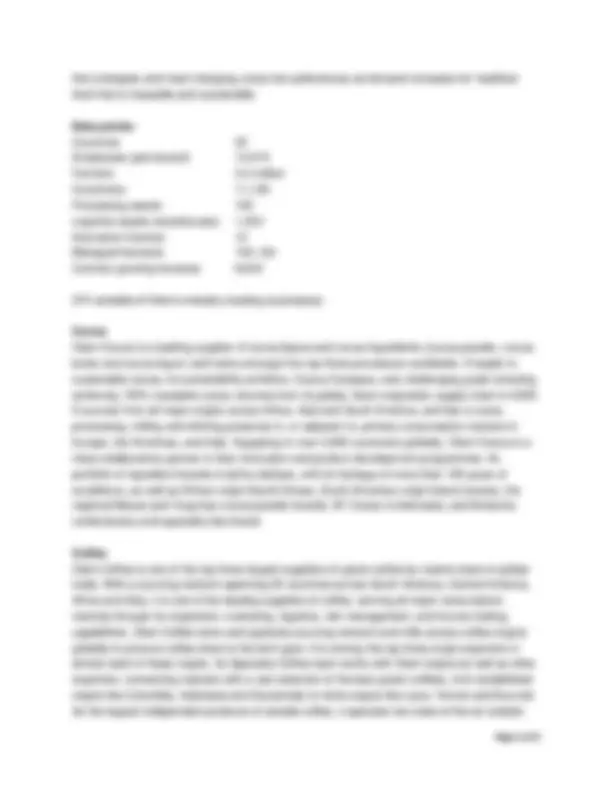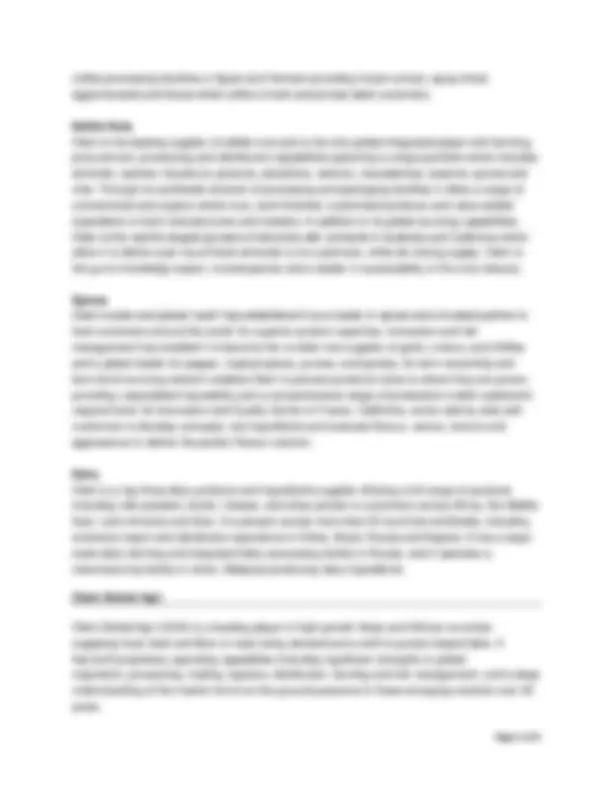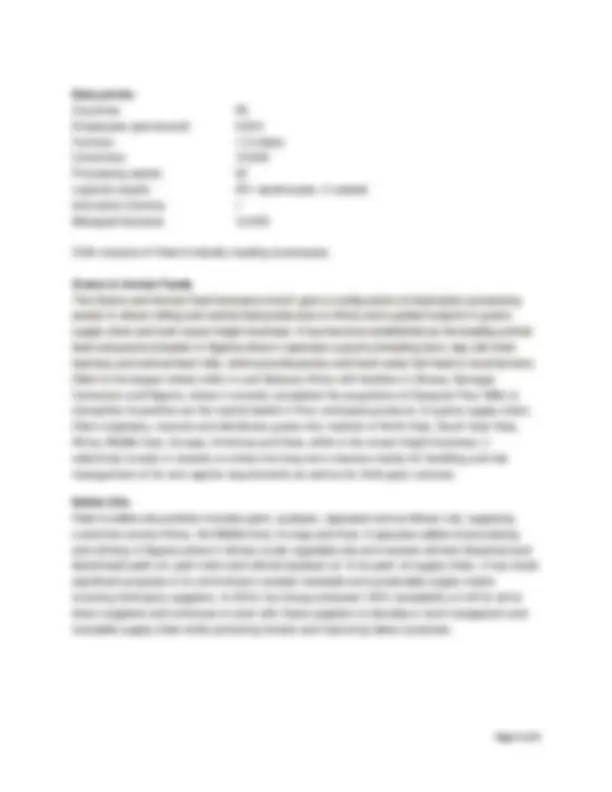





Study with the several resources on Docsity

Earn points by helping other students or get them with a premium plan


Prepare for your exams
Study with the several resources on Docsity

Earn points to download
Earn points by helping other students or get them with a premium plan
Community
Ask the community for help and clear up your study doubts
Discover the best universities in your country according to Docsity users
Free resources
Download our free guides on studying techniques, anxiety management strategies, and thesis advice from Docsity tutors
Agriculture Factsheet Factsheet Agriculture Olam Olam
Typology: Lecture notes
1 / 6

This page cannot be seen from the preview
Don't miss anything!




Olam International is a leading food and agri-business supplying food, ingredients, feed and fibre to 19,800 customers worldwide. Its value chain spans over 60 countries and includes farming, processing and distribution operations, as well as a sourcing network of an estimated 4.8 million farmers. Through our purpose to ‘Re-imagine Global Agriculture and Food Systems’, Olam aims to address the many challenges involved in meeting the needs of a growing global population, while achieving positive impact for farming communities, our planet and all our stakeholders. Headquartered and listed in Singapore, Olam currently ranks among the top 30 largest primary listed companies in terms of market capitalisation on SGX-ST. On January 20, 2020, Olam International announced it will re-organise to create two new operating groups – Olam Food Ingredients and Olam Global Agri – to be held by Olam International. Olam International As the parent company, Olam International provides stewardship to its operating groups and ensures continuity of the “Olam Way”, including the Group’s unique entrepreneurial culture. It implements cross-cutting initiatives, such as AtSource; drives key enablers such as sustainability and digital transformation; and offers shared services to optimise synergies across its operating groups. It is responsible for the divestment of non-core assets and businesses identified in the Strategic Plan and redeploying capital for further growth, as well as for nurturing gestating businesses in the Group to full potential. Olam International will also incubate new engines for future growth, such as the B2C initiative, Farmer Services Platform and Controlled Environment Agriculture. Data points: (all data relates to the businesses listed below): Countries 6 Employees 12, Customers 1, Processing assets 9 Infrastructure & Logistics assets 4 ports in three countries, 1 Special Economic Zone, 50 warehouses Innovation Centres 1 Managed hectares 144,
The businesses within Olam International (not including Olam Food Ingredients and Olam Global Agri) consist of: Packaged Foods Olam’s in-depth understanding of Africa has enabled it to build a packaged foods portfolio in six categories across snacks, culinary and beverages with eight leadership brands in major West African markets, where it manufactures and markets a range of market-leading branded products to consumers. It is among the top two players in tomato paste, seasonings, biscuits, candies and drinking yoghurt in Nigeria. In Ghana, it is the number one player in the biscuit and tomato paste categories. Infrastructure & Logistics Olam’s infrastructure and logistics business operates under three verticals – ARISE Port & Logistics, ARISE Integrated Industrial Platform and ARISE Infrastructure Services. Previously operating as the Gabon Special Economic Zone (GSEZ). the reorganised business manages infrastructure projects in Gabon, Mauritania and Côte d'Ivoire including a special economic zone, a mineral port, a general cargo port, an airport in Gabon, a container port in Mauritania and a bulk port in San Pedro, Côte d'Ivoire. It is a joint venture with the Africa Finance Corporation and other strategic partners at the individual asset level, including Meridiam, STOA and the Gabonese Republic. Olam Palm Gabon Olam Palm Gabon, a 60:40 joint venture with the Republic of Gabon, is the largest Roundtable on Sustainable Palm Oil (RSPO) certified producer in Africa with an overall concession area of 144,000 ha, with over 50% (72,000 ha) of High Conservation Value (HCV) forest, wetlands and savannah permanently protected. Its plantations are the only ones globally to have been independently assessed as climate positive (net draw-down of atmospheric carbon) and it was recognised at the inaugural 2019 RSPO Excellence Awards for its strong commitment to establishing sustainable oil palm plantations that generate net positive impacts through forest conservation. Olam Palm Gabon operates three palm oil mills to produce crude palm oil from fresh fruit bunches coming from these plantations as well as one edible oil refinery where it refines crude palm oil to produce cooking oil which is sold in consumer packs directly to service the local Gabonese market. Olam Food Ingredients Olam Food Ingredients (OFI) offers sustainable, natural, value-added food products and ingredients so that consumers can enjoy the healthy and indulgent products they love. OFI has built a unique global value chain presence including its own farms, farm-gate origination, manufacturing facilities and innovation centres. It partners with customers, leveraging its complementary and differentiated portfolio of “on-trend” food products, to co-create solutions
coffee processing facilities in Spain and Vietnam providing frozen extract, spray dried, agglomerated and freeze-dried coffee to bulk and private label customers. Edible Nuts Olam is the leading supplier of edible nuts and is the only global integrated player with farming, procurement, processing and distribution capabilities spanning a unique portfolio which includes almonds, cashew, hazelnuts, peanuts, pistachios, walnuts, macadamias, sesame, quinoa and chia. Through its worldwide network of processing and packaging facilities it offers a range of conventional and organic whole nuts, semi-finished, customised products and value-added ingredients to food manufacturers and retailers. In addition to its global sourcing capabilities, Olam is the world’s largest growers of almonds with orchards in Australia and California which allow it to deliver year-round fresh almonds to its customers, while de-risking supply. Olam is the go-to-knowledge expert, trusted partner and a leader in sustainability in the nuts industry. Spices Olam’s scale and global reach has established it as a leader in spices and a trusted partner to food customers around the world. Its superior product expertise, innovation and risk management has enabled it to become the number one supplier of garlic, onions, and chillies and a global leader for pepper, tropical spices, purees, and parsley. Its farm ownership and farm-level sourcing network enables Olam to process products close to where they are grown, providing unparalleled traceability and a comprehensive range of products to match customers’ requirements. Its Innovation and Quality Centre in Fresno, California, works side by side with customers to develop concepts, test ingredients and evaluate flavour, aroma, texture and appearance to deliver the perfect flavour solution. Dairy Olam is a top three dairy products and ingredients supplier offering a full range of products including milk powders, butter, cheese, and whey protein to customers across Africa, the Middle East, Latin America and Asia. It is present across more than 20 countries worldwide, including extensive import and distribution operations in China, Brazil, Russia and Nigeria. It has a large- scale dairy farming and integrated dairy processing facility in Russia, and it operates a manufacturing facility in Johor, Malaysia producing dairy ingredients. Olam Global Agri Olam Global Agri (OGA) is a leading player in high-growth Asian and African countries supplying food, feed and fibre to meet rising demand and a shift to protein-based diets. It has built proprietary operating capabilities including significant strengths in global origination, processing, trading, logistics, distribution, farming and risk management, and a deep understanding of the market via its on-the-ground presence in these emerging markets over 30 years.
Data points: Countries 29 Employees ( permanent ) 4, Farmers 1.3 million Customers 10, Processing assets 52 Logistics assets 401 warehouses, 4 vessels Innovation Centres 1 Managed hectares 12, OGA consists of Olam’s industry-leading businesses: Grains & Animal Feeds The Grains and Animal Feed business is built upon a configuration of destination processing assets in wheat milling and animal feed production in Africa and a global footprint in grains supply chain and bulk ocean freight business. It has become established as the leading animal feed and poultry breeder in Nigeria where it operates a poultry breeding farm, day-old-chick hatchery and animal feed mills, which provide poultry and fresh-water fish feed to local farmers. Olam is the largest wheat miller in sub-Saharan Africa with facilities in Ghana, Senegal, Cameroon and Nigeria, where it recently completed the acquisition of Dangote Flour Mills to strengthen its position as the market leader in flour and pasta products. In grains supply chain, Olam originates, markets and distributes grains into markets in North Asia, South East Asia, Africa, Middle East, Europe, Americas and Asia, while in the ocean freight business, it selectively invests in vessels or enters into long-term charters mainly for handling and risk management of its own captive requirements as well as for third party volumes. Edible Oils Olam’s edible oils portfolio includes palm, soybean, rapeseed and sunflower oils, supplying customers across Africa, the Middle East, Europe and Asia. It operates edible oil processing and refining in Nigeria where it refines crude vegetable oils and markets refined, bleached and deodorised palm oil, palm olein and refined soybean oil. In its palm oil supply chain, it has made significant progress in its commitment towards traceable and sustainable supply chains involving third-party suppliers. In 2018, the Group achieved 100% traceability to mill for all its direct suppliers and continues to work with these suppliers to develop a more transparent and traceable supply chain while protecting forests and improving labour practices.